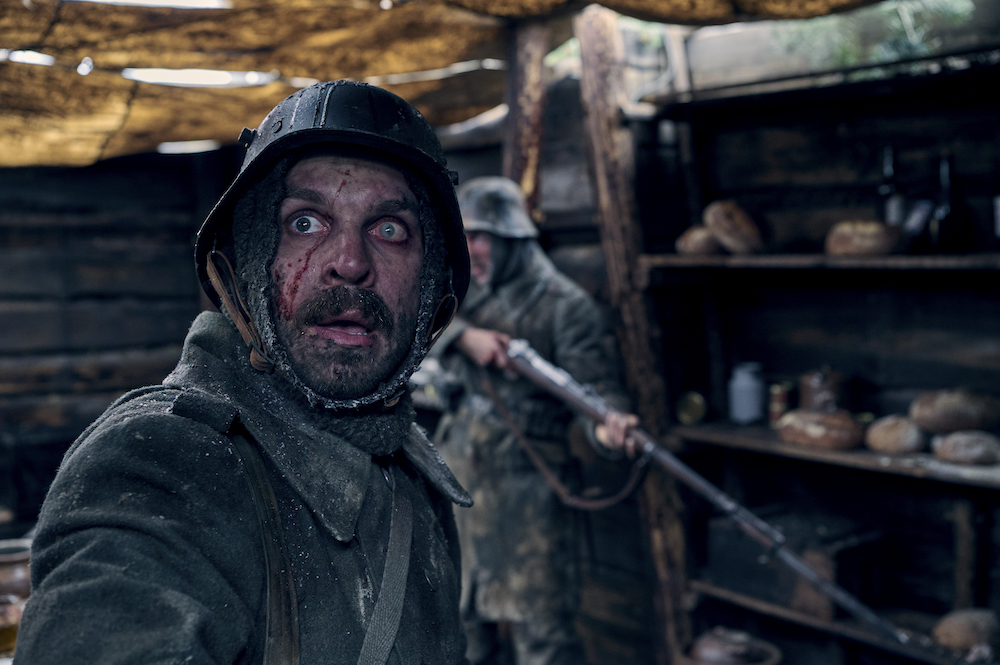Netflix’s ‘All Quiet on the Western Front’ is the story of German soldiers who fight in the First World War. The protagonist is a 17-year-old boy named Paul Baumer, but we also follow the arcs of his three other friends. The four of them join the army with hopes in their hearts. They dream of fighting for their country and winning the war for it. For them, fighting in the war is the most patriotic and heroic thing that they can do. However, once they actually find themselves in the trenches, their thought process takes a sharp turn.
Fighting on the Western Front, they lose some friends while other soldiers join their inner circle. Albert Kropp remains one of Paul’s closest friends, who had been with him since the beginning. They also befriend a man named Tjaden Stackfleet, who helps them adapt to their new life. If you are wondering whether Paul’s friends are based on actual soldiers who served during the war, then here’s what you should know about them. SPOILERS AHEAD.
Albert Kropp and Tjaden Stackfleet Reflect Real WW1 Soldiers
No, Albert Kropp and Tjaden Stackfleet are not based on real-life people. These characters were created by Erich Maria Remarque in his 1929 novel ‘All Quiet on the Western Front’ which serves as the inspiration for the movie. The author served in the First World War when he was 18 years old. His time in the war informed a lot of things in his novel. It is possible that Remarque drew upon his fellow soldiers to concoct the characters of Kropp and Tjaden. However, it isn’t possible to pinpoint exactly who they were.

Through his novel, Remarque aimed to bring forth the horrors of the war rather than glorify it. Through the distinct arcs of his characters, he represented the different ways in which the soldiers would meet their end. The movie, too, carries over this theme and uses Kropp and Tjaden, among others, to show the soldiers’ lives, their hopes and dreams, and their unfateful demise. However, while the Netflix film remains faithful to the core elements of the story, it does change certain details about its characters.
In the movie, Kropp dies horrifically on the battlefield, but in the book, his fate remains uncertain. He suffers an injury that leads to the amputation of his leg. He considers suicide but then decides to give himself another chance. The last Paul sees of him is at the hospital, and the two are never reunited. In the film, the threat of amputation is passed on to Tjaden, who survives in the book. After a horrific battle at the front, Paul finds Tjaden badly wounded. It looks like his leg will have to be cut off.
While it will save his life, Tjaden is horrified by the idea of living as a person who underwent amputation. Therefore, when Paul and Kat bring him soup to eat, he uses the fork to stab himself in the neck. In the book, another patient in Kropp’s ward meets this fate. While the film might have swapped the fates of the characters, both of them focus on a very grim reality of suicide in military service.
A 2021 research focused on post-9/11 military service found that the rate of death by suicide is four times higher than the deaths in military operations. In recent years, the government and the military have become more aware of the need to focus on the mental health of its soldiers. However, the situation was quite different during the First World War. The cases of suicide were not paid as much heed and would often be marked as a case of “temporary insanity.” A lot of times, deaths by suicide were not even reported.
With Tjaden’s death, ‘All Quiet on the Western Front’ turns our attention toward this situation, presenting yet another destructive aspect of war. So, even though Albert Kropp and Tjaden Stackfleet’s characters might not be based on real people, it is fair to assume that the author was influenced by the people and the deaths that he saw during his time in the war. His characters are a reflection of his own experience and hence, are not far from reality.
Read More: Is Stanislaus “Kat” Katczinsky Based on a Real WW1 Soldier?


You must be logged in to post a comment.